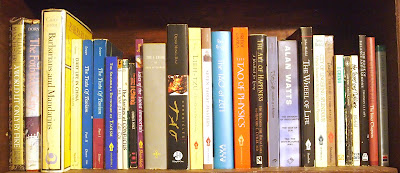Sorry, you’ll have to bear with me for one last navel gazing post. This time about all the books that I haven’t read, plus a few that I have.
I really should mention that these posts are mostly for the benefit of my biographer or a future grad student doing a dissertation on either my art or writing. Since paper letters are rare these days and in any event I’m not much of a correspondent, my blogs and my comments on DeviantArt, hopefully preserved or archived it the Way Back Machine, must serve as original source material for that grad student or biographer. And just in case you’re wondering, I am actually half serious about this.
Anyway, back on topic. The topic on hand is all the books that I haven’t read. Obviously there’s a vast number of them. They fall into three main categories –contemporary popular fiction i.e. bestsellers, non-fiction, and what you could call, important books.
The first category is easy to dispense with – I have read few of the countless bestsellers that have come gone in my life. Of the top of my head, I can think of only two, one is the Girl with the Dragon Tattoo, and the other is… well I can’t think of its name, but it’s set in a boarding school in Ireland, I believe.
While I have read a fair number of non-fiction books, they are mostly older history and military history books. I’ve read books about the city of London, and of England. I’m fascinated by the first years of WWII & the Blitz. Of course I’ve shown you my shelves of nautical books. I have old books of travels in China. But considering that I’ve been reading books for the better part of 60 years, the number of these books is not astoundingly high. In general, I find many non-fiction books to be rather dry. I would much rather learn about, say, the Indian Mutiny by reading a well researched piece of fiction like, Flashman in the Great Game. Or the London Blitz through the eyes of someone who was there, as in The Boy in the Blitz, by Colin Perry, or The Journal London Journal of General Raymond E Lee, than in some sort of official history.
 |
| Some of my books on China and Taoism |
Important books on serious subjects are not much to my taste. I’m not much of a lad for deep thinking. As an international relations major in college, with a special interest in China and the East I came in contact with the three religions of China, Confucianism, Buddhism, and Taoism. It was Taoism that appealed to me. Since that time, I have always considered myself some sort of Taoist. There are many flavors of Taoism, some of them pretty weird, but mine is a philosophical take. I do have a shelf of books on Taoism and Eastern Religion.
The thing is that nothing is really simple. Everything is complicated, once you’ve taken off the cover and peered inside. Some people like taking off the cover and poking about inside, but I’m not one of them. I’m just not that curious about the inner workings of things and people. Rather I prefer to get an intuitive feel for how people and things work and then go with the flow. So when it comes to literary fiction, I’m not much of a lad for stories that delve deeply into how people think and their relationships. Plus, I don’t like dealing with unpleasant people, either in life or in fiction. And it seems that unpleasant people are a staple of literary fiction.
 |
| Kipling. Is he forgotten today? |
This is not to say that I haven’t read any serious literature. I recall that I was, in high school, made to read Wuthering Heights (Much later in means only Kate Bush!) Giants in the Earth (Look behind the haystack!) and Great Expectations (Pip, Mrs Haversham and the wedding cake, which I actually enjoyed.) I have read other Dickens stories all on my own, so one out of the three isn’t too bad. I have also read a Jane Austen book, I believe it was Pride and Prejudice all on my own as well. Plus I spent part of a summer reading and enjoying War and Peace. Plus some Kipling, R L Stevenson, and I’d like to say that the list goes on, but I’ll not lie to you. If it does, I’ve forgotten them. Does R F Delderfield count?
 |
| When Patty Went to College by Jean Webster, 1908 printing. Not great literature, but it was my Grandmother's. She wrote her (maiden) name in it. |
So to sum it all up. I’ve got a wall of books, most of which I’ve read. And compared to many people, I’ve read a lot of books, even if most of them aren’t the “right” kind to be considered an intellectual. But being an intellectual wasn’t what I was shooting for as a reader or in life. I read to be informed and entertained on the odd subjects that interest me. Mostly, I read to be carried to places that are impossible to reach any other way.
I have read these books:


































